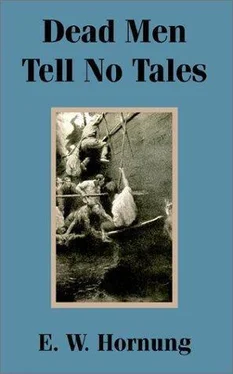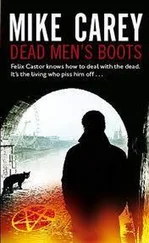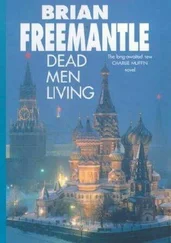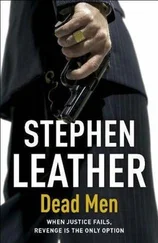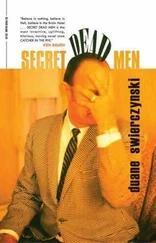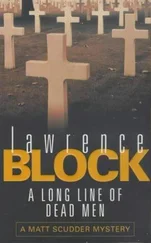E Hornung - Dead Men Tell No Tales
Здесь есть возможность читать онлайн «E Hornung - Dead Men Tell No Tales» весь текст электронной книги совершенно бесплатно (целиком полную версию без сокращений). В некоторых случаях можно слушать аудио, скачать через торрент в формате fb2 и присутствует краткое содержание. Жанр: Старинная литература, на английском языке. Описание произведения, (предисловие) а так же отзывы посетителей доступны на портале библиотеки ЛибКат.
- Название:Dead Men Tell No Tales
- Автор:
- Жанр:
- Год:неизвестен
- ISBN:нет данных
- Рейтинг книги:4 / 5. Голосов: 1
-
Избранное:Добавить в избранное
- Отзывы:
-
Ваша оценка:
- 80
- 1
- 2
- 3
- 4
- 5
Dead Men Tell No Tales: краткое содержание, описание и аннотация
Предлагаем к чтению аннотацию, описание, краткое содержание или предисловие (зависит от того, что написал сам автор книги «Dead Men Tell No Tales»). Если вы не нашли необходимую информацию о книге — напишите в комментариях, мы постараемся отыскать её.
Dead Men Tell No Tales — читать онлайн бесплатно полную книгу (весь текст) целиком
Ниже представлен текст книги, разбитый по страницам. Система сохранения места последней прочитанной страницы, позволяет с удобством читать онлайн бесплатно книгу «Dead Men Tell No Tales», без необходимости каждый раз заново искать на чём Вы остановились. Поставьте закладку, и сможете в любой момент перейти на страницу, на которой закончили чтение.
Интервал:
Закладка:
"Didn't you?" he asked quickly. "Yes, yes, to be sure! There was at least one other beggar skulking down below." He stood looking at me, the knife in his hand, though mine was held out for it. "Don't you think, Mr. Cole, that it's our duty to hand this over to the police? I—I've heard of other cases about these Inns of Court. There's evidently a gang of them, and this knife might convict the lot; there's no saying; anyway I think the police should have it. If you like I'll take it to Scotland Yard myself, and hand it over without mentioning your name."
"Oh, if you keep my name out of it," said I, "and say nothing about it here in the hotel, you may do what you like, and welcome! It's the proper course, no doubt; only I've had publicity enough, and would sooner have felt that blade in my body than set my name going again in the newspapers."
"I understand," he said, with his well-bred sympathy, which never went a shade too far; and he dropped the weapon into a drawer, as the boots entered with the tray. In a minute he had brewed two steaming jorums of spirits-and-water; as he handed me one, I feared he was going to drink my health, or toast my luck; but no, he was the one man I had met who seemed, as he said, to "understand." Nevertheless, he had his toast.
"Here's confusion to the criminal classes in general," he cried; "but death and damnation to the owners of that knife!"
And we clinked tumblers across the little oval table in the middle of the room. It was more of a sitting-room than mine; a bright fire was burning in the grate, and my companion insisted on my sitting over it in the arm-chair, while for himself he fetched the one from his bedside, and drew up the table so that our glasses should be handy. He then produced a handsome cigar-case admirably stocked, and we smoked and sipped in the cosiest fashion, though without exchanging many words.
You may imagine my pleasure in the society of a youth, equally charming in looks, manners and address, who had not one word to say to me about the Lady Jermyn or my hen-coop. It was unique. Yet such, I suppose, was my native contrariety, that I felt I could have spoken of the catastrophe to this very boy with less reluctance than to any other creature whom I had encountered since my deliverance. He seemed so full of silent sympathy: his consideration for my feelings was so marked and yet so unobtrusive. I have called him a boy. I am apt to write as the old man I have grown, though I do believe I felt older then than now. In any case my young friend was some years my junior. I afterwards found out that he was six-and-twenty.
I have also called him handsome. He was the handsomest man that I have ever met, had the frankest face, the finest eyes, the brightest smile. Yet his bronzed forehead was low, and his mouth rather impudent and bold than truly strong. And there was a touch of foppery about him, in the enormous white tie and the much-cherished whiskers of the fifties, which was only redeemed by that other touch of devilry that he had shown me in the corridor. By the rich brown of his complexion, as well as by a certain sort of swagger in his walk, I should have said that he was a naval officer ashore, had he not told me who he was of his own accord.
"By the way," he said, "I ought to give you my name. It's Rattray, of one of the many Kirby Halls in this country. My one's down in Lancashire."
"I suppose there's no need to tell my name?" said I, less sadly, I daresay, than I had ever yet alluded to the tragedy which I alone survived. It was an unnecessary allusion, too, as a reference to the foregoing conversation will show.
"Well, no!" said he, in his frank fashion; "I can't honestly say there is."
We took a few puffs, he watching the fire, and I his firelit face.
"It must seem strange to you to be sitting with the only man who lived to tell the tale!"
The egotism of this speech was not wholly gratuitous. I thought it did seem strange to him: that a needless constraint was put upon him by excessive consideration for my feelings. I desired to set him at his ease as he had set me at mine. On the contrary, he seemed quite startled by my remark.
"It is strange," he said, with a shudder, followed by the biggest sip of brandy-and-water he had taken yet. "It must have been horrible—horrible!" he added to himself, his dark eyes staring into the fire.
"Ah!" said I, "it was even more horrible than you suppose or can ever imagine."
I was not thinking of myself, nor of my love, nor of any particular incident of the fire that still went on burning in my brain. My tone was doubtless confidential, but I was meditating no special confidence when my companion drew one with his next words. These, however, came after a pause, in which my eyes had fallen from his face, but in which I heard him emptying his glass.
"What do you mean?" he whispered. "That there were other circumstances—things which haven't got into the papers?"
"God knows there were," I answered, my face in my hands; and, my grief brought home to me, there I sat with it in the presence of that stranger, without compunction and without shame.
He sprang up and paced the room. His tact made me realize my weakness, and I was struggling to overcome it when he surprised me by suddenly stopping and laying a rather tremulous hand upon my shoulder.
"You—It wouldn't do you any good to speak of those circumstances, I suppose?" he faltered.
"No: not now: no good at all."
"Forgive me," he said, resuming his walk. "I had no business—I felt so sorry—I cannot tell you how I sympathize! And yet—I wonder if you will always feel so?"
"No saying how I shall feel when I am a man again," said I. "You see what I am at present." And, pulling myself together, I rose to find my new friend quite agitated in his turn.
"I wish we had some more brandy," he sighed. "I'm afraid it's too late to get any now."
"And I'm glad of it," said I. "A man in my state ought not to look at spirits, or he may never look past them again. Thank goodness, there are other medicines. Only this morning I consulted the best man on nerves in London. I wish I'd gone to him long ago."
"Harley Street, was it?"
"Yes."
"Saw you on his doorstep, by Jove!" cried Rattray at once. "I was driving over to Hampstead, and I thought it was you. Well, what's the prescription?"
In my satisfaction at finding that he had not been dogging me intentionally (though I had forgotten the incident till he reminded me of it), I answered his question with unusual fulness.
"I should go abroad," said Rattray. "But then, I always am abroad; it's only the other day I got back from South America, and I shall up anchor again before this filthy English winter sets in."
Was he a sailor after all, or only a well-to-do wanderer on the face of the earth? He now mentioned that he was only in England for a few weeks, to have a look at his estate, and so forth; after which he plunged into more or less enthusiastic advocacy of this or that foreign resort, as opposed to the English cottage upon which I told him I had set my heart.
He was now, however, less spontaneous, I thought, than earlier in the night. His voice had lost its hearty ring, and he seemed preoccupied, as if talking of one matter while he thought upon another. Yet he would not let me go; and presently he confirmed my suspicion, no less than my first impression of his delightful frankness and cordiality, by candidly telling me what was on his mind.
"If you really want a cottage in the country," said he, "and the most absolute peace and quiet to be got in this world, I know of the very thing on my land in Lancashire. It would drive me mad in a week; but if you really care for that sort of thing—"
"An occupied cottage?" I interrupted.
"Yes; a couple rent it from me, very decent people of the name of Braithwaite. The man is out all day, and won't bother you when he's in; he's not like other people, poor chap. But the woman 's all there, and would do her best for you in a humble, simple, wholesome sort of way."
Читать дальшеИнтервал:
Закладка:
Похожие книги на «Dead Men Tell No Tales»
Представляем Вашему вниманию похожие книги на «Dead Men Tell No Tales» списком для выбора. Мы отобрали схожую по названию и смыслу литературу в надежде предоставить читателям больше вариантов отыскать новые, интересные, ещё непрочитанные произведения.
Обсуждение, отзывы о книге «Dead Men Tell No Tales» и просто собственные мнения читателей. Оставьте ваши комментарии, напишите, что Вы думаете о произведении, его смысле или главных героях. Укажите что конкретно понравилось, а что нет, и почему Вы так считаете.
